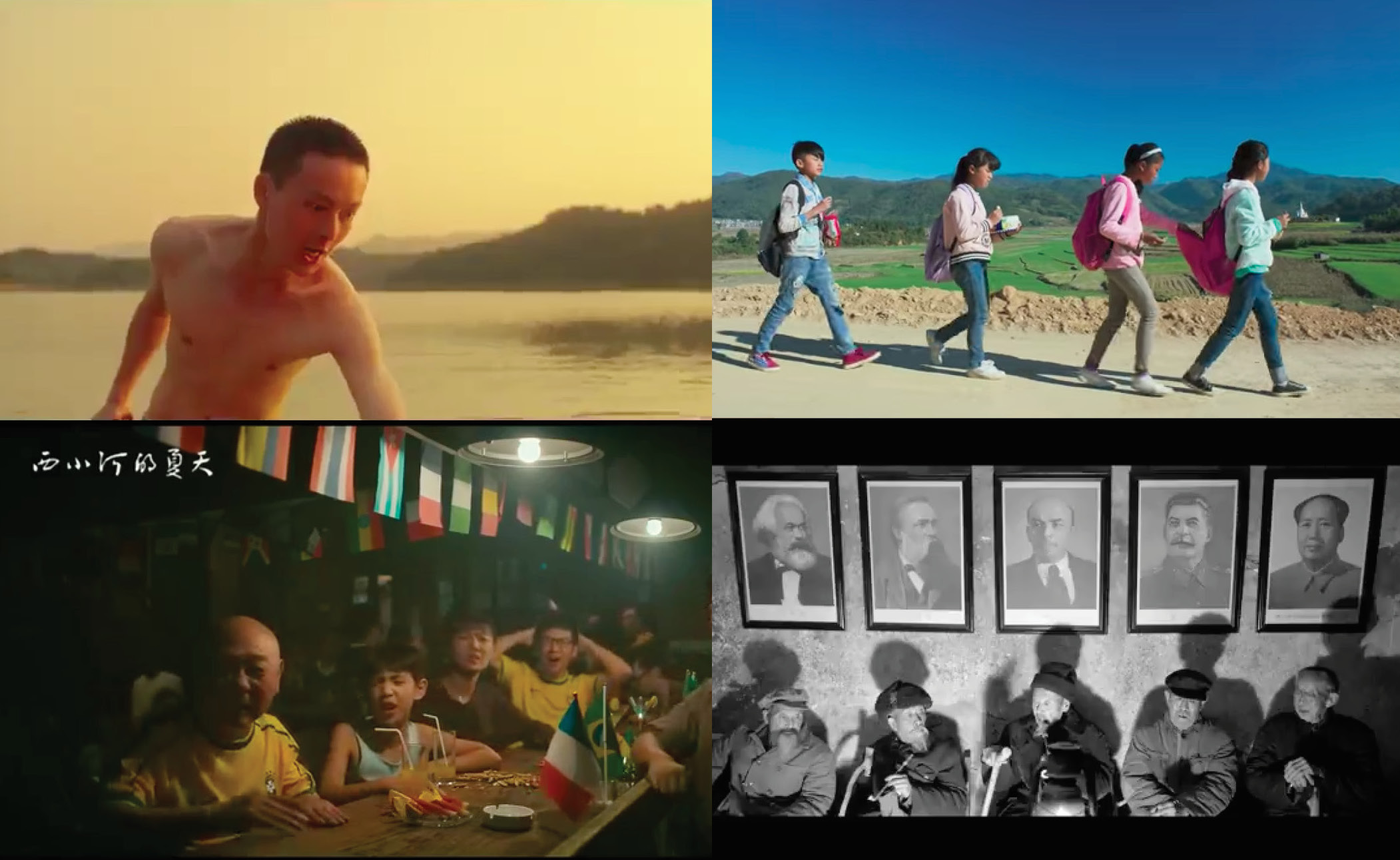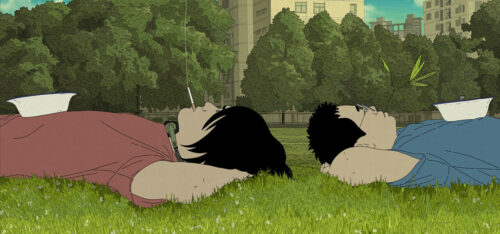‘The Taste of Rice Flower’ and other notable Chinese movies from the Pingyao International Film Festival
The Pingyao Crouching Tiger Hidden Dragon International Film Festival, led by internationally acclaimed director Jia Zhangke 贾樟柯, has come and gone, leaving us with a bevy of movies to watch and mull over. Here are a half-dozen that, for reasons good and bad, left an impression.

Starting from the opening ceremony of the Pingyao International Film Festival (PYIFF) two weeks ago and through to its conclusion on November 4, organizers repeatedly expressed a desire for “the continued development of Chinese films.” Perhaps no other movie better exemplified the organizers’ wishes than this one:
Ash (追·踪)
Director Li Xiaofeng’s 李霄峰 sophomore effort was flying high after an impressive showing at the Busan International Film Festival last month. A gritty crime thriller featuring eye-popping visuals and up-and-coming celebrity Luo Jin 罗晋, Ash tells a gripping tale with a twist. It opens with hard-boiled cop Chen Weikun (played by Nie Yuan 聂远) appearing at a grisly murder scene in a theater. The failure to connect the victim’s stepson (Xin Peng 辛鹏) to the crime results in a cold case, one that reopens upon a fateful meeting with a successful surgeon, Wang Dong (Luo Jin).
In terms of style, Ash features a number of exquisite scenes that are impressive in their meticulousness and daring, solidifying Li as a directorial talent worth tracking. But those watching for substance will find that rewards are few and far between. Ash seemingly betrays its own unconventional narrative with an awkward reveal placed in the middle of the movie, and ultimately sputters to a finish.
Its disloyalty to genre conventions can also be infuriating. As a crime caper, Ash pays little heed to actual police work, as detective Chen’s investigation advances mostly through serendipity. As a thriller, Ash is devoid of suspense, concealing the motives of the protagonists until the very end, when guilt is revealed to be a theme.
A panel of PYIFF audience judges failed to recognize Ash, instead handing out an award called New Generation China to…
The Taste of Rice Flower (米花之味)
Tradition and progress are some of the conflicting themes presented in this crowd-pleasing movie, one of the surprises to emerge from PYIFF.
Upon returning to her ethnic Dai village after working in a Yunnan urban center, Ye Nan (Ying Ze 英泽) finds herself estranged from her increasingly rebellious daughter, Nan Hang (Ye Bule 叶不勒). At odds over everything from video games to divorce, mother and daughter must reconcile their differences before the consequences overwhelm a young girl caught in a changing world.
Director Pang Fei 鹏飞 treats the audience to an insider’s perspective of the Dai minority, documenting the daily customs of these remote people against a compelling landscape. Pang adroitly shows how China’s modernization and widening economic disparity have caused problems for the Dai, who turn to superstitious elders to find solutions.
At first just a thematic appetizer, the Chinese culture on display in The Taste of Rice Flower manifests into its own deus ex machina: The film conclusively affirms that modern Chinese culture will save the Dai, not hinder them.

Kill the Shadow (疲城)
Director Sun Liang 孙亮 leads the viewer through a bizarre road trip in this surreal art house flick that was featured at the 2017 Montreal World Film Festival.
A security guard (Ma Chenglong 马成龙) is forced to confront more than just the pursuing police after a heist gone wrong. But no matter how much he runs, he can’t escape his dreams of becoming a Peking Opera performer.

Desolate and haunting, Kill the Shadow is a descent into the subconscious, filling up its travels with foreboding characters and portent symbols that include the use of pets to indicate a connection to a more innocent time.
Sun uncompromisingly injects subconscious imagery throughout his film. The barren landscape of Gansu Province is used as a backdrop for a stage of self-discovery, proving that the truth is always harsh and enlightenment never easy. Will the film’s unreliable narrator find what he’s after — or will the police find him first?
End of Summer (西小河的夏天)
https://www.youtube.com/watch?v=Zh2Ro57vtjA
Using the 1998 World Cup as a backdrop, End of Summer is one of the most mainstream Chinese films featured at PYIFF. But as validating as this film may be for Chinese culture, director Zhou Quan周全 has crafted something that would be more at home on Chinese state television than among the art house films of PYIFF.
Gu Xiaoyang (Rong Zishan 荣梓杉) is a young student who loves soccer, which his strict authoritarian father, Gu Jianhua (Zhang Songwen 张颂文), can’t tolerate. Caught between his passion and his filial devotion, young Xiaoyang surreptitiously enlists the help of his stubborn elderly neighbor, Grandpa Zheng (Gu Baoming 顾宝明), despite the consequences to come.
Like other coming-of-age stories in China, End of Summer is about families instead of individuals, and how each member of the family has responsibilities that must be fulfilled. Although the film might be compelling in parts, it nevertheless fails to resolve its central conflict, preferring to stage a dramatic climax with Xiaoyang and Grandpa Zheng instead of between father and son.
Depi (德皮)

As one of PYIFF’s Chinese films with the widest aspect ratio, director Hu Yichuan’s 胡艺川 Depi outclasses many of its peers with stunning cinematography of the hills of rural Hunan Province. Unfortunately, for a film that prominently features mental illness, it does little to explore that theme; the title character is a cliché, and he is ostracized from society to conveniently serve the plot.
An altercation at a funeral leads Zheng Chengfeng (Wang Tianyu 王天宇) to a chance encounter with Depi (Chen Tianxing 陈天星), who has fallen on hard times as the village idiot. The film details how he went insane, but it gets itself into somewhat of a narrative mess, without taking the story to a fulfilling thematic conclusion.
Depi turns out to be a cautionary tale of how society — specifically a system that exploits rather than supports its weakest members — failed a good man. Likewise, it’s possible that the film was failed by its filmmaker’s unwillingness — or inability — to unveil the layers of humanity in its title character.
Bangzi Melody (村戏)
As a sobering reminder of China’s struggles with land reform, the film Bangzi Melody offers no clear answers with its formal approach.
Village chief Wang Zhishu (Liang Chunzhu 梁春柱) attempts to assert a voice of reason as the allocation of land to private individuals sparks a frenzy among his constituents. Threatening to disrupt the proceedings is Crazy Kui (Li Zhibing 李志兵), a former soldier with a dark secret, who is unwilling to give up his farm for the greater good.
Bangzi Melody is meticulously constructed with intricate tableaus that make good use of its ensemble cast, at times resembling a stage production more so than a film. Based on a collection of stories by the late Jia Dashan 贾大山, director Zheng Dasheng 郑大圣 makes a bold stylistic choice by depicting the past in color and the present (1982) in black and white. The film won mainland China’s Golden Rooster Award for Best Cinematography.
In the Q&A session following the film’s screening at PYIFF, director Zheng told the audience that land reform is an important topic, but stopped short of offering any opinions. Perhaps Bangzi Melody speaks for itself.





